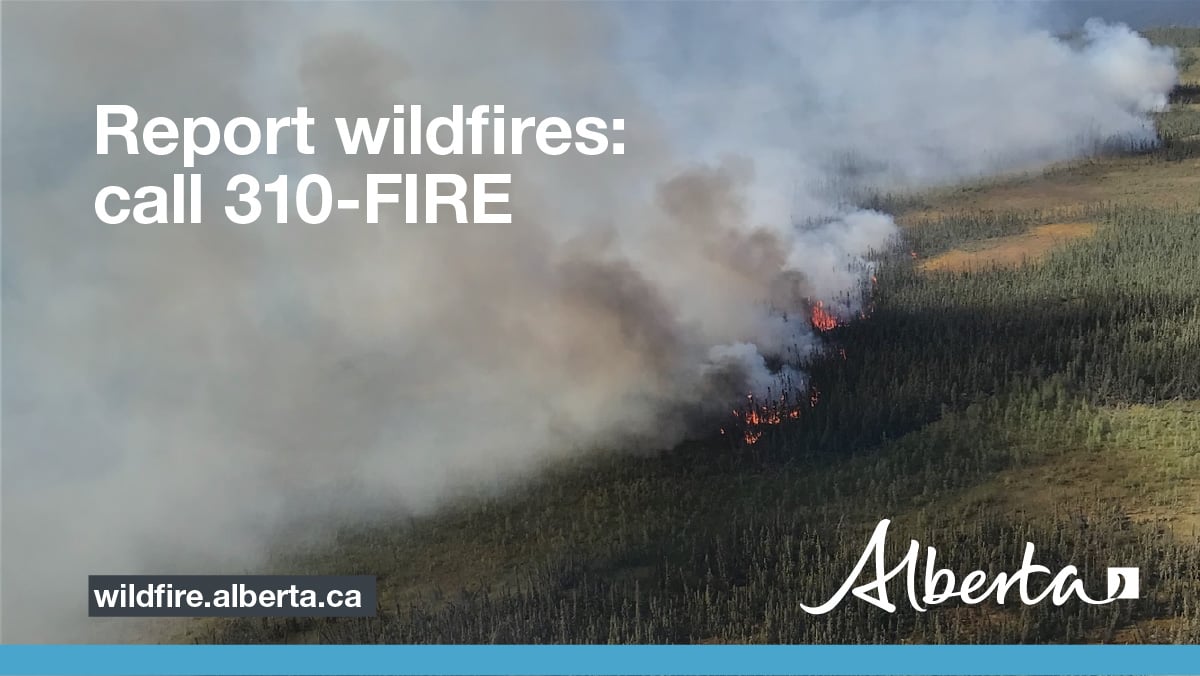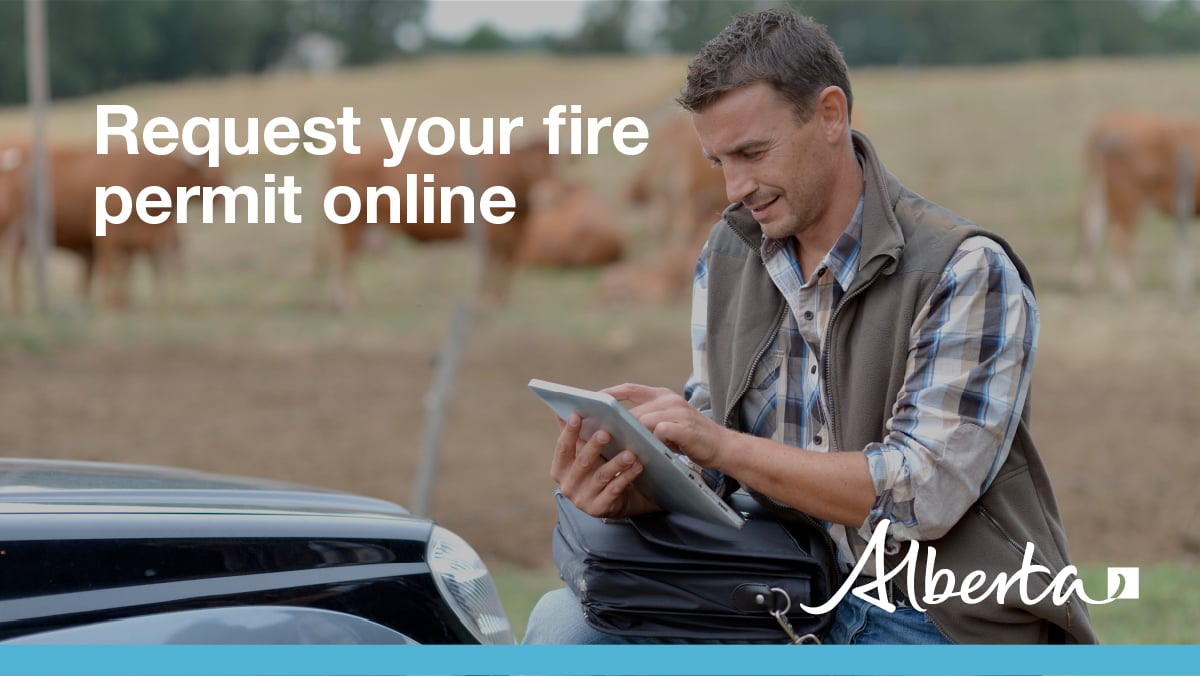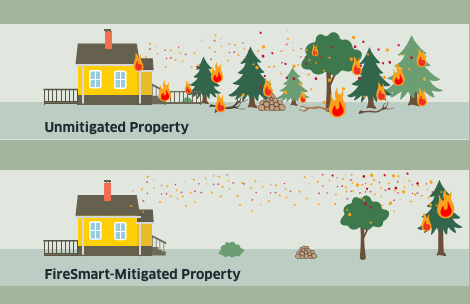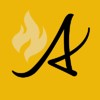
Wildfire danger
The wildfire danger remains HIGH for areas around and south of Lesser Slave Lake and north of Wabasca. For areas north of Lesser Slave Lake the wildfire danger has been reduced to moderate due to scattered showers from yesterday.
Firefighters urge everyone to use caution when working or recreating outdoors. Under the warm and dry conditions, a fire can ignite easily and will spread quickly. Report wildfires immediately by calling 310-FIRE(3473).
There are no fire advisories, restrictions or bans in the Slave Lake Forest Area. For up-to-date information on fire regulations in other parts of Alberta, please visit www.albertafirebans.ca

Smoky conditions
With wind from the northwest and west smoke from wildfires in British Columbia, the Northwest Territories and the Yukon has drifted into the Province of Alberta. Visit www.firesmoke.ca to see where the smoke is coming from. Anyone with health concerns should visit Alberta Health Services or call 811 for health advice from Alberta Health Link.
On Alert
New wildfires may occur with the expected lightning activity. Fire lookouts are watching for smoke and firefighters with helicopters, airtankers and heavy equipment are ready to respond to any new wildfires that start.

Weather
For today, the high will be 24 degrees with a relative humidity of 35-40% Winds will be from the west/northwest 10-15 kilometres per hour. There is a chance of scattered thunderstorms.

Fire permits are required

Current wildfire situation
Yesterday afternoon, lightning sparked 12 new wildfires (SWF138-SWF149) in the Slave Lake Forest Area. Firefighters in helicopters and airtankers responded and fought these wildfires. At this time, seven are being held, one is under control and four have been extinguished. Today, when visibility allows, firefighters and helicopters will be fighting these wildfires. To view these wildfires on a map visit the Alberta Wildfire Status Dashboard.
SWF139, SWF140, SWF142, SWF146, SWF147 and SWF148 range in size from 0.01 to 1.2 hectares. Firefighters with helicopters are currently working on SWF146 and SWF139. As visibility improves and wildfires are extinguished, firefighters will move on to work on the other wildfires.
SWF141 was detected on August 13 and is located approximately 74 kilometres northeast of Wabasca. The wildfire is being held at 84 hectares. Being held means the wildfire is not anticipated to grow past expected boundaries given the current weather and firefighting resources. As soon as visibility improves airtankers will be deployed on this wildfire.
SWF143 was detected on August 13 and is located approximately 27 kilometres northeast of Swan Hills. The wildfire is being held at 13.6 hectares. Being held means the wildfire is not anticipated to grow past expected boundaries given the current weather and firefighting resources. As soon as visibility improves eight firefighters with two helicopters will be deployed on this wildfire.
Firefighters continue to make good progress fighting the wildfires from July. When weather conditions permit, aerial infrared scans are conducted on the wildfires. These scans help locate areas of smouldering ground fire. The results are then provided to firefighters who will extinguish the identified hotspots.
SWF120 was detected on the afternoon of July 14 and is located approximately 20 kilometres northwest of Chipewyan Lake. The wildfire is classified as being held and is 13,282.00 hectares in size. Being held means the wildfire is not anticipated to grow past expected boundaries given the current weather and firefighting resources. A fire guard has been constructed along the south end of the wildfire. Today, there are 20 firefighters with three helicopters working on this wildfire.
SWF124 was detected on July 16 and is located in the Marten Hills, approximately 29 kilometres southwest of Bigstone Cree Nation Wabasca 166D and approximately 46 kilometres northeast of Slave Lake. SWF124 is now under control and is 8,169.00 hectares in size. A fire guard has been constructed along the south and east sides of the wildfire.
SWF130 was detected July 18 and is located approximately 90.7 kilometres northwest of Red Earth Creek. The wildfire is classified as being held and is 1,849.00 hectares. Being held means the wildfire is not anticipated to grow past expected boundaries given the current weather and firefighting resources.
SWF129 was detected July 18 and is located approximately 88 kilometres northwest of Red Earth Creek. The wildfire is classified as being held and is 7,427.00 hectares in size. Being held means the wildfire is not anticipated to grow past expected boundaries given the current weather and firefighting resources. Today, there are 25 firefighters and three helicopters working on the wildfire.
SWF101 was detected on July 11 and is located approximately 47 kilometres northwest of Red Earth Creek. The wildfire is classified as under control and is estimated to be 118.50 hectares.
SWF096 and SWF098 were detected on July 11 and are located approximately 33 kilometres north of Red Earth Creek on the west side of Highway 88. These wildfires are both under control and are 73.20 and 80.4 hectares in size.
SWF095 was detected on July 11 and is located approximately 70 kilometres north of Peerless Lake. It is estimated to be 5,269.00 hectares in size and is classified as under control.
SWF093 was detected on July 11 and is located approximately 85 kilometres north of Red Earth Creek. The wildfire is classified as under control and is estimated to be 2,523.00 hectares. Today, there are nine firefighters working on the wildfire.
SWF076 was detected on July 9th and is located approximately 82 kilometres northwest of Red Earth Creek. The wildfire is under control and is 44.00 hectares in size.
Since January 1, 2024, 149 wildfires have been reported in the Slave Lake Forest Area, resulting in a total burned area of 39,328.20 hectares.
Since January 1, 2024, 1,085 wildfires have been reported in the Forest Protection Area of Alberta, resulting in a total burned area of 635,535.26 hectares.
To view wildfires on a map, download the AB Wildfire App or visit the Alberta Wildfire Status Dashboard
The Forest Protection Area is divided into 10 forest areas. Find the latest updates for each area here or subscribe to receive them in your inbox.
.png?width=1201&height=629&name=WF_Social-images%20(7).png)
Prevent wildfires
67% of wildfires in Alberta are caused by people. Whether you are recreating or working outdoors, please do your part to prevent wildfires.
When having a campfire, keep it small, safe and always attended. When you are leaving the site or going to bed, your campfire must be extinguished. Soak it, stir up the ashes, soak it again to ensure it is out. A campfire is out when you can no longer feel heat from the ashes.
When riding your off-highway vehicle, stop frequently to remove any build-up of debris from your machine. Grass, muskeg, moss or other debris can begin to smoulder and drop to the ground as you're riding and spark a wildfire. Always carry firefighting equipment such as a shovel, extinguisher and bucket when you ride.

FireSmart Alberta
If you have any questions, please contact:
Wildfire Information Officer
Leah Lovequist
Wildfire Information Officer
Mobile:780-849-0945
RELATED INFORMATION
Forest Area Updates:
Websites:
